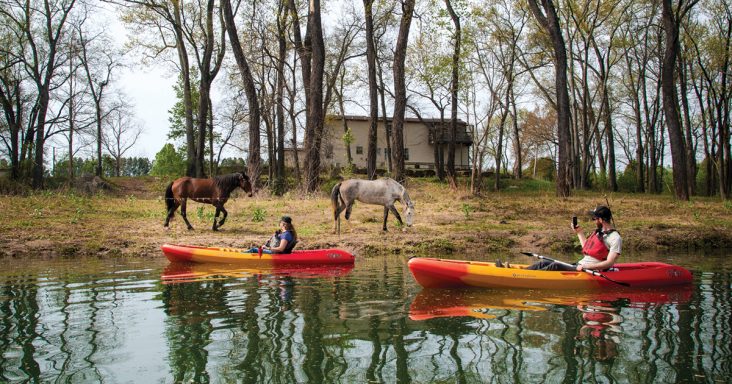Poke or Polk: Arkansas’ oldest city, Batesville, celebrates 200 years with dual celebration
by September 8, 2021 5:03 pm 2,423 views

Sunshine often dapples the streets of Batesville and a curvy drive down Ramsey Mountain into town is a feast for the eyes. The White River flows along the south edge of town, and the downtown historic district has been rebuilt in recent years.
Batesville, the oldest city in Arkansas, is promoting its outdoorsy and artsy vibe as it prepares to celebrate its 200th anniversary in September.
City alderman and historian Tommy Bryant said Batesville was platted into streets and blocks in 1812, and the first recorded history indicates there was a settlement and tavern at the mouth of Poke Bayou in 1812. Batesville is the third name of the city. It was originally Napoleon, then Poke Creek. It was finally named Batesville in honor of Judge James Woodson Bates, who was the first territorial delegate to Congress.
In conjunction with the celebration of Batesville, Poke Bayou Foundation will also have the Big Fun on the Bayou Festival. The festival was planned for 2020, but because of the pandemic, it was postponed.
Bob Carius, co-chair of the festival administration committee, says the bayou is a major player in the history of Batesville. The bayou feeds into the White River and draws people from all over to float the stream.
“Original settlers set up their camps in 1812 on the peninsula that juts out into the bayou just before it dumps into the White River,” Carius says. “Later, as floods convinced the settlers that the peninsula was not a place to have a city, they moved eastward to what is now our downtown business district.”
These days, the bayou is a great place to canoe, kayak and swim. City council member Brittany Bennett says she counted 98 floaters on the bayou over the course of one weekend last summer.
“It has great potential for attracting not only local citizens but folks from other parts of the state to enjoy its smooth ride and interesting bank life,” Carius says.
So, is it Poke Bayou or Polk Bayou? That is a question many people ask, and there may be a different answer depending on who is asked.
There is a plant growing along the banks of the bayou called poke sallet, which many settlers would eat. It is said that is how the Poke Bayou got its name. However, some historical books and local signs call the stream Polk Bayou.
“It is our contention that the stream has always been Poke to those having settled here,” Carius says. “It would appear that some cartographer must have approached a local years ago and asked the name of the stream. The answer was Poke, but in the southern pronunciation, it sounded like Polk and the cartographer obviously didn’t know the existence of the leafy plant that grows nearby.”
Carius thinks it’s Poke, and the new foundation that has been established is the Poke Bayou Foundation.
“My ‘Polk Bayou’ kids book series is based on the history of Batesville,” says Mark Rorie, local author and business owner. Rorie, who lives on the bayou, says in his research, he found a map dated 1888 that spelled it Polk Bayou.
“I’ve seen it spelled Poke Bayou, and recently I ran across Polk Cemetery up near Mountain View, close to where Polk Bayou starts,” Rorie continues. “Was it named after a local plant, or a family name? Or after President James K. Polk when the first U.S Post Office appeared here? I really don’t know.”
Bryant also says he believes the Batesville Post Office is the oldest operating post office in the state.
“In the very early years, the U.S. Government moved the Federal Land Office from Northeast Arkansas to Batesville, resulting in Batesville becoming the center of governmental operations,” Bryant says. “This was decades before Arkansas became a state in 1836.”
The early settlers of Batesville were educated people, such as doctors, lawyers, and clergymen.
“In 1871 when the University of Arkansas was authorized, Batesville and Fayetteville were in a bidding war for the location of the UofA,” Bryant says. “After losing out to Fayetteville, the Presbyterian leadership in Batesville established Arkansas College, now known as Lyon College.”
In 1959, the Arkansas legislature passed the Act 9 Bond Law, which resulted in considerable development to most cities in Arkansas, including Batesville.
Because of the significance of the bayou to the history of Batesville, it made sense to combine the two celebrations into one big one. Carius says this has also led to many more events being planned. There will be several water activities, including canoe rentals and demonstrations on how one enters a kayak or canoe into the water. A Game and Fish rescue boat will be on the scene for water races. Saturday will be a full day of foot races, water races, music, food, and craft vendors.
There will also be a time capsule buried in Maxfield Park, and Carius says the Big Fun on the Bayou will grow and become the “go to” event in future years.
“The city will continue to attract new homeowners and visitors with the many positive things that have occurred recently,” Carius says. “We are on a roll.”
The Big Fun on the Bayou and the 200th celebration of Batesville will begin around 5 p.m. Sept. 10, and begin again around 7:30 a.m. Sept. 11. For more information and a schedule of events, visit mainstreetbatesville.com.
